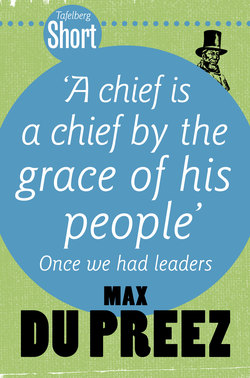Читать книгу Tafelberg Short: A chief is a chief by the grace of his people - Max du Preez - Страница 4
На сайте Литреса книга снята с продажи.
ОглавлениеA monumental failure
There is probably only one topic on which there is presently complete consensus among analysts, commentators and the public: the South African malaise of the last few years can largely be ascribed to what Dr Mamphela Ramphele has called a ‘monumental failure of leadership’.
Politicians and their acolytes often attempt to divert the attention from this accusation by talking about Africa being misunderstood or by blaming colonialism, apartheid, neoliberalism and/or the white minority’s ‘undermining’ of the post-1994 democracy.
Many writers on leadership refer to statesmen like Franklin D Roosevelt and Winston Churchill or business leaders like Lee Iacocca and Steve Jobs as examples of great leaders.
And yet southern Africa has a rich crop of exemplary, sometimes spectacular, leaders in its precolonial and early colonial past. Men and women of vision, wisdom, courage and principle.
Why would South Africans look outside the subcontinent for role models when there are so many right here at home?
There is probably a good psychological reason for this that must have something to do with our inferiority complex – and for the fact that when we do recall great leaders from our past, we tend to go to aggressive, military men like King Shaka, Chief Mzilikazi or General Christiaan de Wet.
But another reason is that we as South Africans have yet to fully reclaim our history from the clutches of colonialist and Afrikaner nationalist historians. Far too few scholars are engaged in rediscovering and reinterpreting the people and stories of our subcontinent’s past.
A major stumbling block, of course, is that precolonial African societies did not read and write. This means that we have to explore oral history, which can sometimes be somewhat problematic, and read the versions of colonialists, missionaries and other white historians, applying several filters as we do so in order to get to the truth distorted by prejudice, arrogance and ignorance.
When we do explore the leadership qualities, styles and vision of some of southern Africa’s kings, chiefs and political philosophers of yesterday, we find that present leaders’ excuses of colonialism, apartheid, Western imperialism, capitalism, white intransigence and neoliberalism become very thin indeed.
1. Paul Kruger: The Memoirs of Paul Kruger (London: T. Fisher Unwin, 1902), p 69
